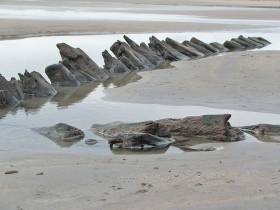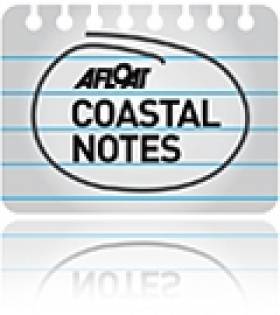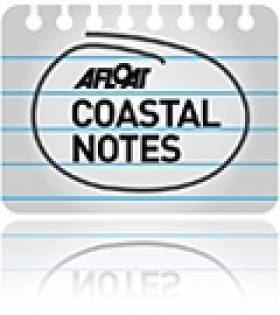Displaying items by tag: Streedagh
Sligo Group Promoting Armada Links Honoured By Spanish King
#SpanishArmada - A Sligo-based group dedicated to promoting the northwest coastal area’s links with the historic Spanish Armada has been honoured by the King of Spain in a special ceremony this week, as RTÉ News reports.
The Plate of the Order of Isabel La Católica, the highest civil order granted by King Felipe VI, was presented by Spanish Ambassador to Ireland José María Rodríguez-Coso to the members of the Grange and Armada Development Association (GADA) at Sligo Town Hall.
The first Irish recipients of the honour, recognising groups and individuals who foster relationships between Spain and the international community, have worked hard to promote and preserve the history of the three Spanish Armada ships that were wrecked at Streedagh in 1588.
Three years ago, an almost completely intact rudder from one of the armada ships was discovered on the beach at Streedagh. Following that a number of cannons and other ship artefacts were recovered on dives to the wreck sites.
And the search for more items from the shipwrecks is ongoing, with marine archaeologists’ latest survey of the area taking place over the summer, according to TheJournal.ie.
The event comes almost a year after the Spanish Navy sailed into Sligo town for the first time since the armada in 1588 for a ceremony in memory of that historic fleet, as previously reported on Afloat.ie.
Armada Wreckage Washed Onto Sligo Shore
#SpanishArmada - More wreckage from Spanish galleons shipwrecked off the northwest coast more than 400 years ago has been washed up on a Sligo beach.
And according to The Irish Times, it's possible that this weekend's low tides could expose even more remnants from the three vessels - sparking concerns for the integrity of the wreck sites, which lie in 15 metres of water some 60 metres from the low tide mark.
Donal Gilroy from the Grange and Armada Development Association (GADA) said the wooden objects found on the beach this week had "been buried off Streedagh for nearly 430 years. It is lucky they were not carried out by the tide.”
The find comes just months after a near fully intact rudder, believed to be from one of the 1588 fleet, was discovered at Streedagh beach by a local farmer.
“This is a protected site but we worry that these boats are being moved by storms," added Gilroy. "They have thrown up more in the last two years than in the previous 40."
The Irish Times has more on the story HERE.
Farmer Finds 'Important Piece Of History' At Spanish Armada Wreck Beach
#SpanishArmada - A rudder from a ship that formed part of the Spanish Armada discovered at a beach in Co Sligo recently has been transferred to the care of the National Museum for preservation and study.
As Sligo Today reports, the 20-foot rudder was found on the beach at Streedagh – renowned for hosting the wrecks of three ships from the 1588 galleon fleet – by a local farmer, who contacted the Department of Heritage's Underwater Archaeology Unit.
Dr Nessa O'Connor of the National Museum, who was engaged to dive at the Streedagh site with Dr Douglas McElvogue of the Mary Rose Trust, was said to be so impressed with the discovery that she arranged for it to be immediately removed for preservation.
The rudder is almost completely intact, with a piece missing which the archaeologists believe may have been picked up at random by a passer by believing it to be driftwood.
It's hoped that this part can be recovered to put together "an important piece of history". Sligo Today has more on the story HERE.































































